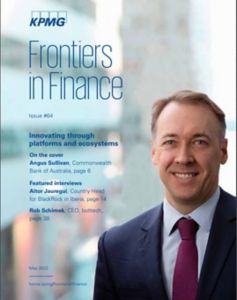Call it the third wave of data value for financial services. Or simply call it a natural evolution of data maturation. No matter what you call it, what is clear is that many financial services firms are now looking at the value of their data in an entirely new light.
At first, the value of data was in its ability to make routine processes more efficient. Automation was applied, data was captured and analyzed, transactions and business processes were executed faster and more efficiently. The second wave was about taking data out of siloes and integrating it across the enterprise in order to do things better. Processes were reimagined, experiences were created, the way financial services were delivered was vastly improved. Yet it was still about the transactions and the business processes.
What makes the third wave of data value different is that financial institutions — of different types and sizes — are now looking at their data as a business unto itself. They see that demand for interesting combinations of data is growing rapidly among both clients and third parties. And they know they are sitting on a potential gold mine of information and insights. Simply put, the third wave is about data monetization and value creation.
Just consider how a simple combination of transaction and mobility data could help inform consumer choices or retailer investment decisions. Or the value a real estate investor may get from combining property insurance data and ESG metrics with weather and fire data. Or perhaps the certainty and insight created for investors when asset managers combine traditional financial measures with independent ESG ratings to provide a clear picture of a private company’s actual carbon footprint or climate risk.
The lines become blurred
In part, this third wave is an extension of the last two waves; an ongoing effort to help improve the way financial services are delivered. Financial institutions are integrating sources of data in order to innovate the services and products they deliver to their clients. Auto insurers are combining customer data with weather and mobility data, for example, to better assess risk and price policies. They are also packaging their information and insights up and providing them to mobility companies as a unique data stream.
The market for interesting combinations of data may seem like it’s exploding; but right now, this is likely just the spark of the fling. The big bang is yet to come.
Indeed, many financial services organizations are starting to see this burgeoning demand for market data as an opportunity to create new revenue streams and business models. And it’s not just about anonymizing their customer data and selling it to third parties. There is a growing number of financial services organizations that are creating entire ecosystems around market data, supported by slick analytics technologies and capabilities, and focused on delivering niche market insights.
The range of potential use cases are almost immeasurable. And this is just scratching the surface when it comes to the types of data that is available, the ways the data could be integrated and the insights that could be generated. The market for interesting combinations of data may seem like it is exploding; but right now this is likely just the spark of the flint. The big bang has yet to come.
From data to value
Over the past few years, KPMG professionals have spent a lot of time talking with various financial services institutions about their data, the value it contains and potential opportunities to capture that value. And this experience suggests the leaders are focusing on four key areas:
1. They are building dynamic ecosystems. They are thinking broadly about the types of data they could be integrating, the potential sources of that data and the value they could generate. They are partnering with customers, competitors, and non-traditional players to help uncover new sources of value. They see their data ecosystems as agile and dynamic constructs that shift as expectations change.
2. They are asking interesting questions. The value you can derive from data is largely dependent on whether you are asking valuable questions. The leaders are making sure they are asking the right questions, based on a clear understanding of where value can be created. And they are bringing together the right sources of data — at the right quality and integrity — to deliver on demand.
3. They are taking ethics and privacy seriously. From understanding the levels of consent around certain data sources to striving to ensure that machine learning models are being trained on ethical and unbiased data, the leaders are taking steps to help ensure that the data they are using and monetizing is being used appropriately — both internally and by the organizations they share it with.
4. They are applying new management capabilities. The leaders are defining the competencies and capabilities that are expected to be relevant for data-driven products and services in the future. They are focusing on enhancing their management and board capabilities to keep pace with the innovation they are hoping to achieve. And they are focusing on creating models that match where the marketplace is going.
Just getting started
The implications for financial institutions could be massive. On the one hand, the explosion of new market data is creating opportunities and disruption within competitive marketplaces. Large players with sophisticated analytics and access to data have certain advantages. But so, too, do smaller players with more agile approaches and niche ecosystems or value propositions.
Nobody is suggesting that financial institutions should start thinking of themselves as data companies; what FIs bring to the table is a legacy of trust, security, and financial acumen. But now they are also bringing rich sources of data and innovative business models to monetize its value. A new wave of data value is clearly on the horizon.
This article is featured in Frontiers in Finance – Innovating through platforms and ecosystems
Explore other articles ›
Subscribe to receive the latest financial services insights directly to your inbox ›
Connect with us
- Find office locations kpmg.findOfficeLocations
- kpmg.emailUs
- Social media @ KPMG kpmg.socialMedia
Stay up to date with what matters to you
Gain access to personalized content based on your interests by signing up today






